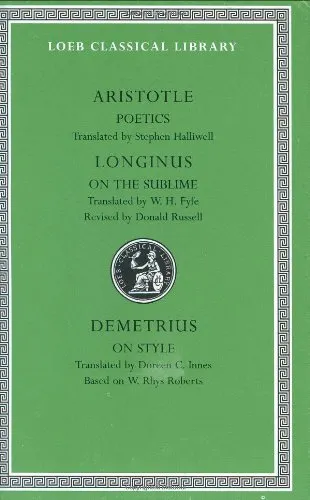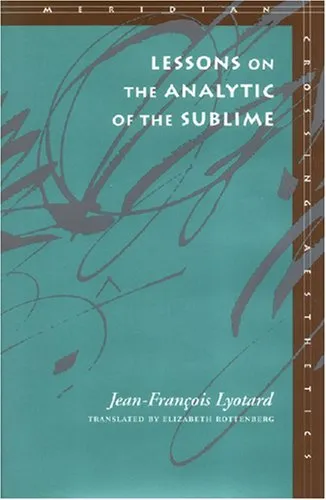Aristotle: Poetics; Longinus: On the Sublime; Demetrius: On Style
4.5
بر اساس نظر کاربران

شما میتونید سوالاتتون در باره کتاب رو از هوش مصنوعیش بعد از ورود بپرسید
هر دانلود یا پرسش از هوش مصنوعی 2 امتیاز لازم دارد، برای بدست آوردن امتیاز رایگان، به صفحه ی راهنمای امتیازات سر بزنید و یک سری کار ارزشمند انجام بدینکتاب های مرتبط:
مقدمهای بر کتاب 'Aristotle: Poetics; Longinus: On the Sublime; Demetrius: On Style'
این کتاب مجموعهای از سه اثر بزرگ در زمینه نظریه ادبیات و هنر از سه فیلسوف و نویسنده بزرگ یونانی، ارسطو، لونگیوس و دمتریوس است. هر یک از این نویسندگان با دیدگاهها و نظریات منحصربهفرد خود به توسعه دانش انسان در باب اثرگذاری هنر و زیباییشناسی کمک کردهاند.
خلاصه کتاب
در آغاز، ارسطو در کتاب 'Poetics' به مفاهیمی چون تراژدی، کمدی و حماسه میپردازد. او به تحلیل ساختار این آثار ادبی پرداخته و عناصر کلیدی مانند پیرنگ، شخصیتپردازی و کاتارسیس را بررسی میکند. ارسطو به اهمیت بازنمایی و تقلید از عمل انسانی در هنرها تأکید دارد و معتقد است که تراژدی بیشترین تأثیر روانی را بر روی مخاطب دارد.
در بخش دوم، لونگیوس، در 'On the Sublime' به مفهوم والایی در هنر میپردازد. او به توصیف شیوههایی میپردازد که نویسندگان و هنرمندان میتوانند اثری بر شنوندگان و بینندگان بگذارند که ذهن آنها را فراتر برد. لونگیوس بر این باور است که عظمتی که آثار هنری بر روح انسان وارد میکند توانایی بیشتری برای تأثیرگذاری عاطفی و عقلانی دارد.
در نهایت، دمتریوس در 'On Style' سبکهای مختلف نوشتاری را تحلیل میکند. او به بررسی چهار نوع اصلی سبک میپردازد: ساده، جذاب، بزرگ، و ظریف. دمتریوس به اهمیت انتخاب سبک مناسب متناسب با محتوا و هدف متن میپردازد و تأکید میکند که تاثیر نهایی یک اثر تا حد زیادی به شیوه بیان آن بستگی دارد.
نکات کلیدی
- تحلیل ساختاری اثر ادبی برای فهم بهتر و نقد آن ضروری است.
- والایی و عظمت در هنر میتواند تأثیرات عمیقتری بر مخاطب داشته باشد.
- انتخاب سبک مناسب نویسندگی بستگی به هدف و پیام مورد نظر دارد.
- هنر نقش مهمی در بیداری احساسات و تفکر انسان ایفا میکند.
جملات معروف از کتاب
«تراژدی تقلیدی است که احساس ترس و شفقت را در بیننده برمیانگیزد و این احساسات او را تصفیه و پاک میکند.» - ارسطو
«عظمت در هنر به ندرت با میانبرها و سادگیهای معمولی حاصل میشود؛ بلکه بر اساس عمق و والایی فکری است.» - لونگیوس
اهمیت این کتاب
این کتاب به دلیل گردآوری سه اثر کلاسیک و تأثیرگذار در زمینه نظریه ادبیات و زیباییشناسی اهمیت ویژهای دارد. آموزههای این نویسندگان هنوز هم مبنا و نقطه شروع بسیاری از مطالعات و تحقیقات در زمینههای مرتبط است. همچنین، این کتاب به درک عمیقتری از هنر و تأثیرات روانی و اجتماعی آن کمک میکند و به خوانندگان ابزارهایی برای تحلیل و نقد آثار ادبی و هنری در اختیار میگذارد. وجود نظرات سهگانهای از نویسندگان مختلف در این کتاب، خوانندگان را به بررسی تطبیقی و نیز به یافتن نقاط اتصال میان دیدگاههای متفاوت دعوت میکند.
Welcome to a comprehensive exploration of literary criticism and theory through the eyes of three monumental figures of antiquity: Aristotle, Longinus, and Demetrius. Their works collectively form a cornerstone in the study of literature, providing insight into tragedy, the sublime, and rhetoric. The book 'Aristotle: Poetics; Longinus: On the Sublime; Demetrius: On Style' is a rich compilation that continues to guide and influence modern literary critique and practice.
Detailed Summary
Aristotle's Poetics is one of the earliest surviving works of dramatic theory, examining the principles of drama and poetry. Aristotle delves into the anatomy of tragedy, defining its core components such as plot, character, diction, thought, spectacle, and song. He famously introduces concepts like catharsis, peripeteia, and anagnorisis, which have become foundational in the understanding of dramatic narratives.
Longinus' On the Sublime, although more fragmented than the other treatises, provides an incisive analysis of greatness in literature. This piece distinguishes itself by focusing on how certain texts evoke profound emotional responses and create a sense of awe, transcending mere technical perfection. Longinus explores a variety of sources for sublimity, ranging from nature to human emotions, championing those works capable of elevating the human spirit.
Demetrius' On Style is a rhetorical manual that investigates the power of language and style. His treatment of literary style categorizes it into four types: the plain, the grand, the elegant, and the forceful. Demetrius offers insights into how writers can modulate their style to fit different contexts and purposes, emphasizing the flexibility and versatility required in effective communication.
Key Takeaways
- Aristotle's ideas about tragedy and dramatic structure form the basis of Western storytelling.
- Longinus highlights the importance of emotional impact and the power of language to provoke profound reflection.
- Demetrius' exploration of style underscores how linguistic nuances influence the effectiveness of communication.
- These works collectively emphasize the harmony between content and form in achieving literary excellence.
Famous Quotes from the Book
Aristotle: "A tragedy is that which, by arousing pity and fear, produces a catharsis of such emotions."
Longinus: "Sublimity is the echo of a great soul."
Demetrius: "A style which is concise and rich bears the impression of a vigorous mind."
Why This Book Matters
This book is essential reading for anyone interested in the foundations of literary and rhetorical theory. Aristotle's systematic approach to literature has influenced a wide range of disciplines beyond literary studies, including philosophy and psychology. Longinus' discussion on the sublime offers a perspective that continues to resonate in discussions about artistic impact and emotional engagement. Demetrius' practical advice on style reminds us of the power of well-chosen words in shaping thought and communicating with an audience.
By bridging classical ideas with contemporary literary analysis, this collection invites readers to appreciate the enduring relevance of ancient wisdom in understanding human expression. For scholars, students, and enthusiasts of literature alike, the teachings of Aristotle, Longinus, and Demetrius provide invaluable insights that enrich the study of texts across all genres and cultures.
دانلود رایگان مستقیم
You Can Download this book after Login
دسترسی به کتابها از طریق پلتفرمهای قانونی و کتابخانههای عمومی نه تنها از حقوق نویسندگان و ناشران حمایت میکند، بلکه به پایداری فرهنگ کتابخوانی نیز کمک میرساند. پیش از دانلود، لحظهای به بررسی این گزینهها فکر کنید.
این کتاب رو در پلتفرم های دیگه ببینید
WorldCat به شما کمک میکنه تا کتاب ها رو در کتابخانه های سراسر دنیا پیدا کنید
امتیازها، نظرات تخصصی و صحبت ها درباره کتاب را در Goodreads ببینید
کتابهای کمیاب یا دست دوم را در AbeBooks پیدا کنید و بخرید
1320
بازدید4.5
امتیاز50
نظر98%
رضایتنظرات:
4.5
بر اساس 0 نظر کاربران
"کیفیت چاپ عالی بود، خیلی راضیام"



